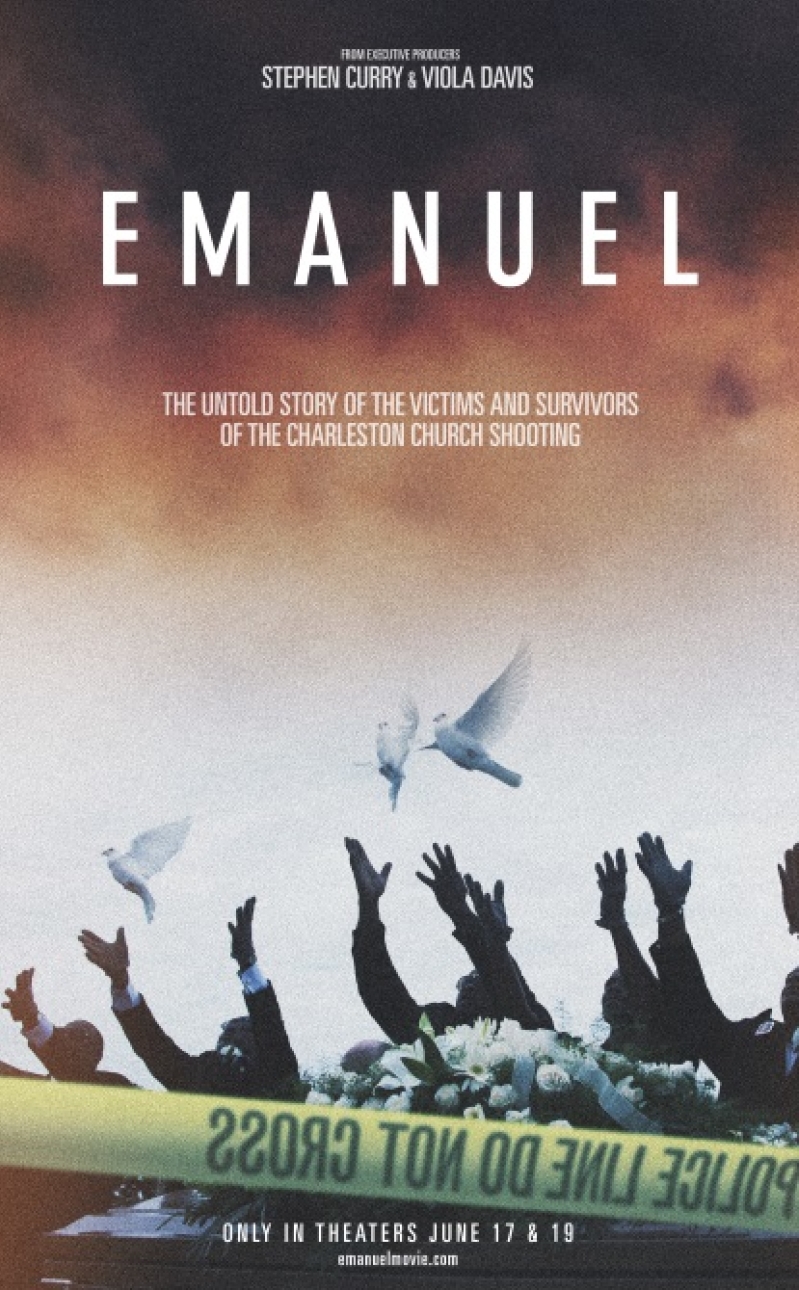
In 2015, the United States was left reeling after a 21-year-old white supremacist opened fire during a Bible study at Emanuel AME Church in Charleston, South Carolina, leaving nine African-Americans dead.
But what man intended for evil, God used for good.
To the shock of a watching world, forty-eight hours later, in the midst of unspeakable grief and suffering, the families of the Emanuel Nine made a stunning announcement: They had forgiven shooter Dylann Roof for the heinous act.
Their decision to forgive Roof and to work toward reconciliation sparked a movement of kindness that impacted cities far beyond Charleston.
Marking the fourth anniversary of the tragic event, executive producers Stephen Curry and Viola Davis, co-producer Mariska Hargitay, and director Brian Ivie (The Drop Box) present "Emanuel."
The film features intimate interviews with survivors and family members and highlights the healing power of forgiveness. The documentary, in theaters for two nights only -- June 17 and 19 -- powerfully weaves the history of race relations in Charleston, the significance and impact of Mother Emanuel Church, and the hope that miraculously resulted from the horrific shooting.
The film was made in direct partnership with the City of Charleston and the families affected by the tragedy. The producers will donate their share of profits from the film to the survivors of the shooting and the families of the victims.
In an exclusive interview with The Gospel Herald, "Emanuel" director Brian Ivie shares his heart for the film -- and why he believes the documentary will unite the world in a powerful way.
GH) Why did you decide to make this documentary?
BI) We all heard this story when it came on the news back in 2015, but I was on my honeymoon in Cancun at the time and I came inside the hotel one day to hear my wife crying. She said, 'nine people just got shot at a church -- and the families have forgiven the shooter." I remember looking at my wife and saying, "I hope whoever tells that story doesn't skip that part." I really was just kind of stunned by the response of the families to the killer, and I felt like this was a story that needed to be told.
GH) How was your own worldview affected or shifted as you made this documentary?
BI) As a Christian, you're challenged to think, "would I react this way if my mom or wife was killed?" Survivor Polly Shepherd talks about how there were two lights in the room the day of the killing: The light of the Lord's presence, and the light of the laser of the gun. These families have been through so much, yet they've seen God's presence. That was a challenge to me. But on a more human level, I was challenged to understand that racism does still exist, and there are still wounds that exist. I understand the pain of the African-American community on a deeper level.
CP) Why do you think this particular tragedy affected millions around the United States on such a deep level?
BI) I think it goes to the heart of what America is. We understand that the church is supposed to be the one place you can find refuge and safety, that's why the African-American community spends 4 hours in a service as opposed to getting in and out of there. You feel human and alive there, and so for that to be violated, it cut deep for people. And the white community was saddened and burdened by it, as well. I think that motivated people to show up and say, "we want to be there with you."
CP) Why do you we need this film now?
BI) We're incredibly divided and that it's only becoming more extreme. It's gonna take people who have been through pain and tragedy and have forgiven others to bring us together. Our world needs leadership and love like that. It's saying, "I will bear the full weight of wrong and still wish good on the wrongdoer." It's so important in our day and age. We live in a world where people don't know God exists at all, so I hope people get a glimpse of Him showing up in a situation where He was most needed.
GH) Why was it important to make this film in direct partnership with the City of Charleston and all ten families affected by the tragedy?
BI) I wanted to tell the story to honor these martyrs. They died doing what they believed in most. The families said to me, "we want the world to know where God was in all of this." It was essential to me; I wanted the family to tell their stories. I didn't want it to be about Dylann Roof. It's a redemptive story. These families were the first to see the film, and they've all given it their blessing.
Polly Shepherd, the survivor, watched the film and couldn't stop crying. She embraced me after watching it and shared how healing it was for her.
GH) What do you want viewers to take away from this film?
BI) I want people to take away that God is real and He participates in our suffering, primarily in the person and work of Jesus Christ. That's my heart. It's hard to feel that; I didn't know that people who had gone through such tragedy could be healed, but they still go to Bible study to this day. I hope people come away understanding the healing that comes with crying out to God in prayer. 'Emanuel' is an example of what happens when people do that. The film is not just about faith; it's about justice and trying to get a place in our country where we can repent and heal, and that's when we can come together and understand God's plan for us.






